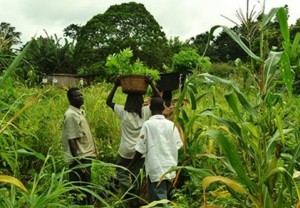African countries urged to reduce poverty, food insecurity by upgrading agriculture
 Despite having 60 per cent of the world’s arable land, Africa is the only region in the developing world where agriculture productivity is low.
Despite having 60 per cent of the world’s arable land, Africa is the only region in the developing world where agriculture productivity is low.
The Economic Commission for Africa (ECA) has therefore called on African countries to transform their agriculture sector so as to reduce poverty and address food insecurity.
In a press release issued in Addis Ababa and copied to ghanabusinessnews.com, the ECA’s Executive Secretary, Carlos Lopes was quoted as saying, “African agriculture is in urgent need of an upgrade and fast-track into 21st century productivity.”
Mr. Adam Elhiraika, Director of the Macroeconomic Policy Division at the ECA, in a statement read on behalf of the Executive Secretary, during the opening of the African Economic Research Consortium Biannual Research workshop on ‘Agriculture and Structural Transformation in Africa’, said Africa is home to about 60 per cent of the world’s arable land and yet it remains the only region in the developing world where agricultural productivity is both low and falling with per capita output at 56 per cent of the world average.
“ECA studies have shown that Africa’s per capita agricultural production fell by about five per cent over the last 20 years up to 2013 while it increased by 40 per cent in other developing countries. Loans and investments in the sector have equally plummeted during the past two decades,” he said.
He noted that about four out of five Africans rely on agriculture for their livelihoods, adding that most poor people not only depend on agriculture, they also live in rural areas.
“To realise the potential of the sector, researchers advocate for a sustained transformation based on consistent policies and effective implementation strategies,” he said.
“Agriculture in Africa remains where the greatest potential for increasing broad-based growth and sustainable wealth creation currently lies, and it can offer the greatest potential for the reduction of poverty and inequality,” he said.
By Emmanuel K. Dogbevi
